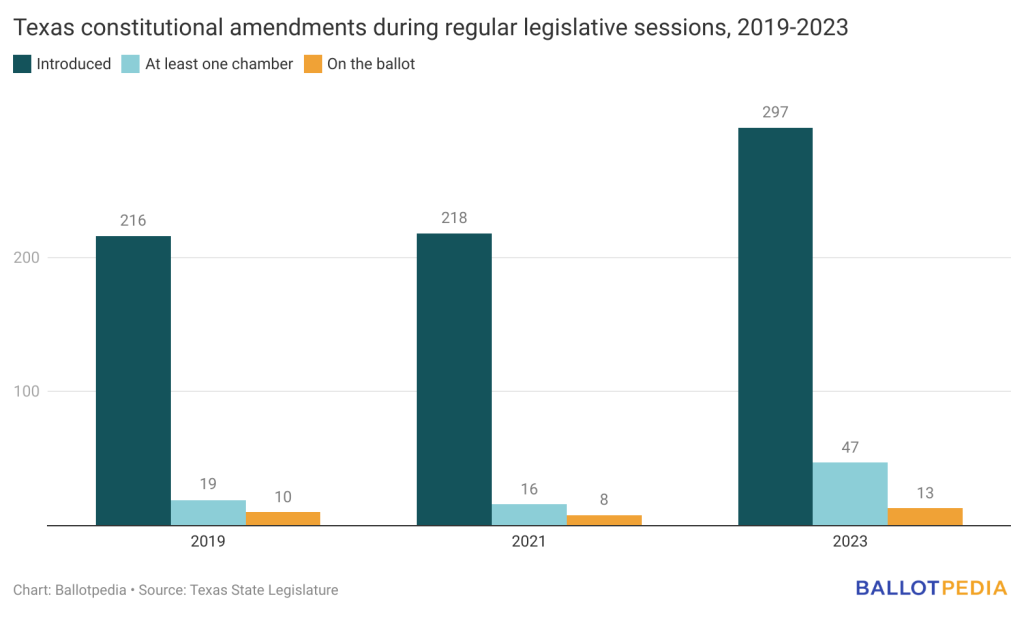Texas voters will decide on 13 constitutional amendments this November—the most since 2007 when voters decided on 17 measures on two election dates. The average number of measures appearing on Texas odd-numbered-year ballots was 14 between 1985 and 2021. The year with the highest number of measures was 1987 with 25 on one election date.
The state legislature adjourned its regular session on May 29, taking final votes on four of the 13 amendments over the weekend. The final additions to the ballot relate to creating a state broadband infrastructure fund; creating a state energy fund to modernize electric generation facilities; creating a state water fund to finance water projects; and renaming the National Research University Fund to the Texas University Fund and establishing an ongoing revenue source from the accrued interest of the rainy day fund.
The nine other previously certified amendments relate to:
- issuing bonds for conservation districts in El Paso County;
- establishing a right to farming and ranching;
- increasing the mandatory retirement age for state judges and justices;
- abolishing the office of Galveston County treasurer;
- providing for tax exemptions on medical equipment and inventory;
- prohibiting a wealth or net worth tax;
- providing for tax exemptions on childcare facilities;
- creating the Centennial Parks Conservation Fund; and
- providing cost-of-living adjustments for annuitants of the Teacher Retirement System.
The state legislature convened on Jan. 10. The Texas State Legislature is one of 16 states that requires a two-thirds vote in each legislative chamber—100 votes in the House and 21 votes in the Senate (assuming no vacancies)—during one legislative session to refer a constitutional amendment to the ballot. During the 2023 legislative session, legislators introduced 297 constitutional amendments, of which 47 passed at least one chamber. This compares to 218 introduced constitutional amendments with 16 passing at least one chamber in 2021 and 216 amendments with 19 passing at least one chamber in 2019.
One 2023 amendment that would have stated that only citizens could vote in Texas passed the Senate but failed in the House by a vote of 88-0 with 54 present and not voting.
Excluding the four newest additions to the ballot that do not have official vote totals yet, the average number of yes votes in both chambers for amendments on the 2023 ballot was 150. This is lower than the average yes votes received by amendments appearing on even and odd-numbered year ballots in Texas between 1995 and 2022, which was 164 votes.
The 2023 right-to-farm amendment received the most yes votes with 175. The amendment to prohibit a wealth or net worth tax received the fewest yes votes with 123—surpassing the two-thirds supermajority threshold by one vote in both chambers.
During the 2023 legislative session, Republicans controlled both chambers of the state legislature, as well as the governor's office, making Texas a Republican trifecta. At the general election on November 8, 2022, Republicans retained control of the House and Senate, increased their 86-64 majority in the House, and gained one seat in the Senate. The new majority in the Senate following the election was 19-12. Changes in the state have impacted the prospects of constitutional amendments making the ballot. Republicans held 21 seats in the state Senate in 2018, which was enough to pass a constitutional amendment without support from Democrats. In 2023, Republicans held 19 seats, meaning at least two Democrats were needed to pass a constitutional amendment in the state Senate.
Gov. Greg Abbott (R) called a special session that convened on May 29 to address property taxes and the border. During the regular session, the Senate introduced a constitutional amendment to increase the homestead exemption from $40,000 to $70,000, which was amended by the House to $100,000. However, the two chambers did not pass a final version of the amendment prior to the regular session adjournment.
Gov. Abbott last called for a special legislative session in August 2021 that resulted in the placement of two constitutional amendments on the May 2022 ballot—the first even-numbered year statewide measures since 2014.
In Texas, a total of 281 ballot measures appeared on statewide ballots between 1985 and 2022. Two hundred forty-eight ballot measures were approved, and 33 ballot measures were defeated.




